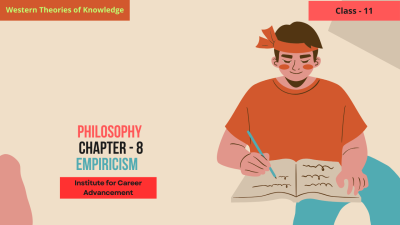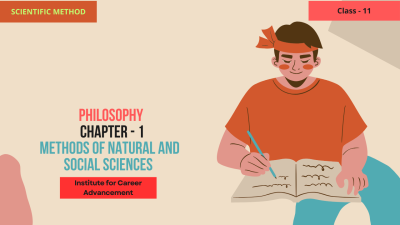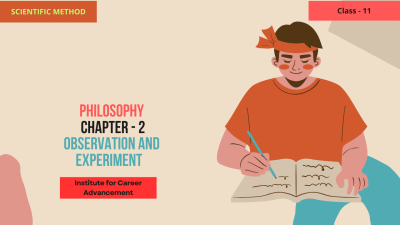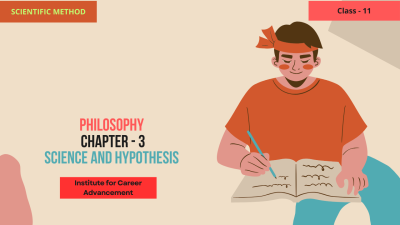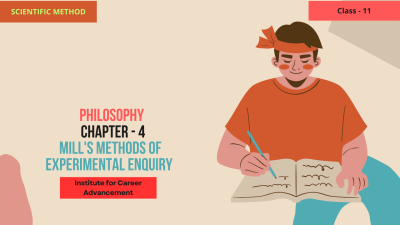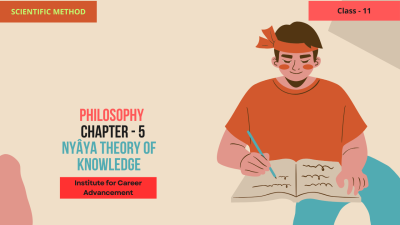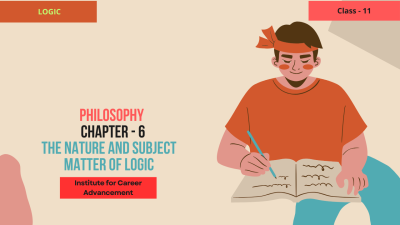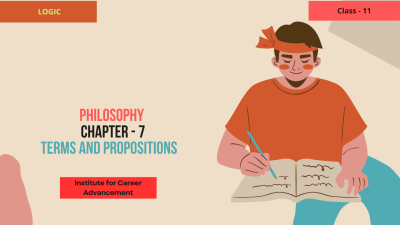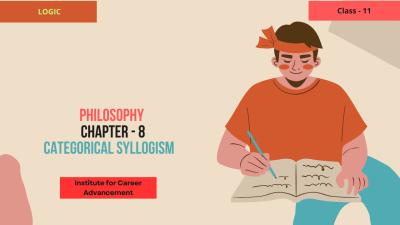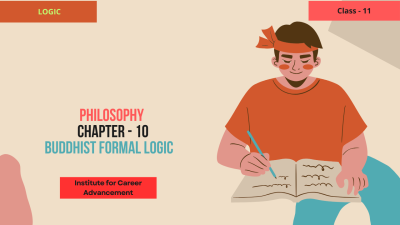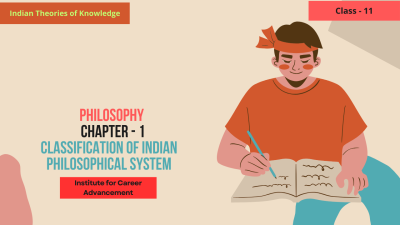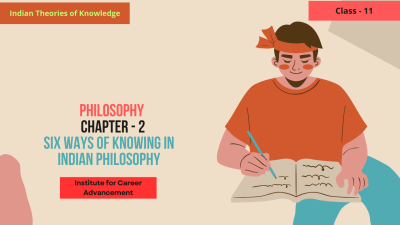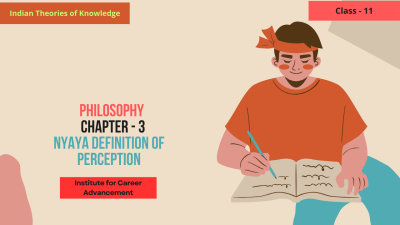Course description
Empiricism is a foundational theory in philosophy that emphasizes the role of sensory experience in the acquisition of knowledge. In a Class 11 course, students explore the key concepts of empiricism, the major philosophers who contributed to it, and how it contrasts with other epistemological theories such as rationalism. Here's an overview of what is typically covered under Empiricism in Class 11.
1. Introduction to Empiricism
Definition: Empiricism is the philosophical theory that all knowledge is derived from sensory experience. Empiricists argue that human beings come into the world with a "blank slate" (tabula rasa), and knowledge is built through experience.
Key Idea: Empiricists maintain that only what can be directly observed or experienced through the senses can be considered knowledge. The mind starts without any innate ideas, and it gathers knowledge through the senses over time.
2. Key Philosophers of Empiricism
John Locke (1632–1704): Locke is considered one of the most significant proponents of empiricism. He argued that the mind is a blank slate at birth (tabula rasa) and that knowledge is acquired through sensory experience. Locke also proposed that individuals can distinguish between primary qualities (objective) and secondary qualities (subjective) of objects.
George Berkeley (1685–1753): Berkeley further developed empiricism with his famous principle "Esse est percipi" ("To be is to be perceived"). He argued that reality consists only of minds and their ideas, emphasizing the importance of perception in forming knowledge.
David Hume (1711–1776): Hume is known for his radical empiricism and skepticism. He argued that all knowledge comes from sensory impressions and that humans cannot know anything beyond immediate experience. Hume questioned the idea of causality and the existence of the self, stressing that all beliefs about the world are based on habit rather than reason.
3. Core Concepts of Empiricism
Tabula Rasa (Blank Slate): This is the idea that individuals are born without innate knowledge, and experience through the senses is the source of all knowledge.
Sense Perception: Empiricists emphasize that knowledge is derived from direct sensory experience (sight, hearing, touch, taste, and smell). For example, knowledge of a tree is based on perceiving its shape, color, and other sensory qualities.
Inductive Reasoning: Empiricists rely on inductive reasoning, where general principles are derived from specific observations or experiences. This is in contrast to deductive reasoning, which starts from general principles to reach specific conclusions.
Impressions and Ideas (Hume): According to Hume, impressions are vivid sensory experiences, while ideas are the less vivid mental representations of those impressions. Knowledge is built through the manipulation and association of these ideas.
4. Empiricism vs Rationalism
Rationalism argues that reason is the primary source of knowledge and that some knowledge is innate. Empiricism, in contrast, asserts that all knowledge comes from experience and sensory observation, rejecting the notion of innate ideas.
The key difference lies in how knowledge is acquired: empiricists argue that experience shapes knowledge, while rationalists believe that reason alone can lead to knowledge, often independent of experience.
5. Knowledge and Experience
Empirical Knowledge: Knowledge is gained through experience and observation. Empiricists believe that people cannot know anything without first perceiving it through their senses. For instance, one can only know about a flower after perceiving its color, shape, and smell.
Causality: In empiricism, knowledge of causality is derived from observing patterns in the world. Hume, however, famously questioned whether humans can truly know causality, suggesting that our belief in cause and effect is based on habit, not rational proof.
6. The Scientific Method and Empiricism
Observation and Experimentation: Empiricism plays a significant role in the development of the scientific method. The scientific method relies on observation, experimentation, and evidence gathered through sensory experience to form theories and hypotheses.
Objectivity: Empiricists emphasize objectivity in gathering knowledge. Knowledge is based on observable phenomena and measurable facts, rather than personal beliefs or theories not supported by experience.
7. Criticism of Empiricism
Over-reliance on Sensory Experience: Critics argue that sensory experience can be deceptive, and not all knowledge can be derived from the senses. For instance, abstract concepts like mathematics or ethics may not be fully explained by sensory experience.
Limits of Induction: While empiricism relies on induction (generalizing from specific observations), critics point out that induction is not foolproof. Generalizations based on limited experience may not always be accurate.
অভিজ্ঞতাাদ দর্শনের একটি মৌলিক তত্ত্ব যা জ্ঞান অর্জনে সংবেদনশীল অভিজ্ঞতার ভূমিকার উপর জোর দেয়। একাদশ শ্রেণির কোর্সে, শিক্ষার্থীরা অভিজ্ঞতার মূল ধারণাগুলি, এতে অবদান রাখা প্রধান দার্শনিকদের এবং যুক্তিবাদের মতো অন্যান্য জ্ঞানতাত্ত্বিক তত্ত্বগুলির সাথে এটি কীভাবে বৈপরীত্য দেখায় তা অন্বেষণ করে। সাধারণত একাদশ শ্রেণিতে অভিজ্ঞতার আওতায় যা অন্তর্ভুক্ত করা হয় তার একটি সংক্ষিপ্ত বিবরণ এখানে দেওয়া হল। 1টি। অভিজ্ঞতার পরিচয় সংজ্ঞাঃ অভিজ্ঞতাাদ হল দার্শনিক তত্ত্ব যে সমস্ত জ্ঞান সংবেদনশীল অভিজ্ঞতা থেকে উদ্ভূত হয়। অভিজ্ঞতাত্ত্বিকরা যুক্তি দেন যে মানুষ একটি "ফাঁকা স্লেট" (ট্যাবুলা রস) নিয়ে পৃথিবীতে আসে এবং জ্ঞান অভিজ্ঞতার মাধ্যমে নির্মিত হয়। মূল ধারণাঃ অভিজ্ঞতত্ত্ববিদরা মনে করেন যে ইন্দ্রিয়ের মাধ্যমে যা সরাসরি পর্যবেক্ষণ বা অভিজ্ঞতা করা যায় কেবল তাকেই জ্ঞান হিসাবে বিবেচনা করা যেতে পারে। মন কোনও সহজাত ধারণা ছাড়াই শুরু হয় এবং সময়ের সাথে সাথে ইন্দ্রিয়ের মাধ্যমে জ্ঞান সংগ্রহ করে। 2. অভিজ্ঞতার মূল দার্শনিকরা জন লক (1632-1704) লককে অভিজ্ঞতার অন্যতম উল্লেখযোগ্য প্রবক্তা হিসাবে বিবেচনা করা হয়। তিনি যুক্তি দিয়েছিলেন যে মন জন্মের সময় একটি ফাঁকা স্লেট (তাবুল রস) এবং জ্ঞান সংবেদনশীল অভিজ্ঞতার মাধ্যমে অর্জিত হয়। লক আরও প্রস্তাব করেছিলেন যে ব্যক্তিরা বস্তুর প্রাথমিক গুণাবলী (উদ্দেশ্যমূলক) এবং গৌণ গুণাবলীর (বিষয়গত) মধ্যে পার্থক্য করতে পারে। জর্জ বার্কলে (1685-1753) বার্কলে তাঁর বিখ্যাত নীতি "এস ইস্ট পার্সিপি" ("হতে হবে উপলব্ধি করা") দিয়ে অভিজ্ঞতাবাদকে আরও উন্নত করেছিলেন। তিনি যুক্তি দিয়েছিলেন যে বাস্তবতা কেবল মন এবং তাদের ধারণাগুলি নিয়ে গঠিত, জ্ঞান গঠনে উপলব্ধির গুরুত্বের উপর জোর দিয়েছিলেন। ডেভিড হিউম (1711-1776) হিউম তার মৌলবাদী অভিজ্ঞতা এবং সংশয়বাদের জন্য পরিচিত। তিনি যুক্তি দিয়েছিলেন যে সমস্ত জ্ঞান সংবেদনশীল ছাপ থেকে আসে এবং মানুষ তাৎক্ষণিক অভিজ্ঞতার বাইরে কিছু জানতে পারে না। হিউম কার্যকারণ এবং স্বের অস্তিত্বের ধারণা নিয়ে প্রশ্ন তুলেছিলেন, জোর দিয়ে বলেছিলেন যে বিশ্ব সম্পর্কে সমস্ত বিশ্বাস যুক্তির পরিবর্তে অভ্যাসের উপর ভিত্তি করে। 3. অভিজ্ঞতার মূল ধারণাগুলি তাবুলা রস (ফাঁকা স্লেট) এই ধারণাটি হল যে ব্যক্তিরা সহজাত জ্ঞান ছাড়াই জন্মগ্রহণ করে এবং ইন্দ্রিয়ের মাধ্যমে অভিজ্ঞতা সমস্ত জ্ঞানের উৎস। ইন্দ্রিয়ের উপলব্ধিঃ অভিজ্ঞতত্ত্ববিদরা জোর দেন যে জ্ঞান সরাসরি সংবেদনশীল অভিজ্ঞতা (দৃষ্টি, শ্রবণ, স্পর্শ, স্বাদ এবং গন্ধ) থেকে উদ্ভূত হয়। উদাহরণস্বরূপ, একটি গাছের জ্ঞান তার আকৃতি, রঙ এবং অন্যান্য সংবেদনশীল গুণাবলী অনুধাবনের উপর ভিত্তি করে। আবেগময় যুক্তিঃ অভিজ্ঞতাকারীরা আবেগময় যুক্তির উপর নির্ভর করেন, যেখানে সাধারণ নীতিগুলি নির্দিষ্ট পর্যবেক্ষণ বা অভিজ্ঞতা থেকে উদ্ভূত হয়। এটি অনুমানমূলক যুক্তির বিপরীতে, যা নির্দিষ্ট সিদ্ধান্তে পৌঁছানোর জন্য সাধারণ নীতিগুলি থেকে শুরু হয়। ইমপ্রেশনস অ্যান্ড আইডিয়াজ (হিউম) হিউমের মতে, ইমপ্রেশনগুলি প্রাণবন্ত সংবেদনশীল অভিজ্ঞতা, অন্যদিকে ধারণাগুলি সেই ইমপ্রেশনগুলির কম প্রাণবন্ত মানসিক উপস্থাপনা। এই ধারণাগুলির কারসাজি এবং সংযোগের মাধ্যমে জ্ঞান তৈরি হয়। 4. অভিজ্ঞতাাদ বনাম যুক্তিবাদ যুক্তিবাদ যুক্তি দেয় যে যুক্তি হল জ্ঞানের প্রাথমিক উৎস এবং কিছু জ্ঞান সহজাত। এর বিপরীতে, অভিজ্ঞতাবাদ দাবি করে যে সমস্ত জ্ঞান অভিজ্ঞতা এবং সংবেদনশীল পর্যবেক্ষণ থেকে আসে, সহজাত ধারণার ধারণাকে প্রত্যাখ্যান করে। জ্ঞান কীভাবে অর্জিত হয় তার মধ্যে মূল পার্থক্যটি রয়েছেঃ অভিজ্ঞতত্ত্ববিদরা যুক্তি দেন যে অভিজ্ঞতা জ্ঞানকে রূপ দেয়, অন্যদিকে যুক্তিবাদীরা বিশ্বাস করেন যে শুধুমাত্র যুক্তিই জ্ঞানের দিকে নিয়ে যেতে পারে, প্রায়শই অভিজ্ঞতা থেকে স্বাধীন। 5. জ্ঞান ও অভিজ্ঞতা. অভিজ্ঞতাগত জ্ঞানঃ অভিজ্ঞতা এবং পর্যবেক্ষণের মাধ্যমে জ্ঞান অর্জন করা হয়। অভিজ্ঞতত্ত্ববিদরা বিশ্বাস করেন যে, মানুষ তাদের ইন্দ্রিয়ের মাধ্যমে প্রথমে উপলব্ধি না করে কিছুই জানতে পারে না। উদাহরণস্বরূপ, একটি ফুল সম্পর্কে কেবল তার রঙ, আকৃতি এবং গন্ধ বোঝার পরেই জানা যায়। কার্যকারণঃ অভিজ্ঞতায়, কার্যকারণের জ্ঞান বিশ্বের নিদর্শন পর্যবেক্ষণ থেকে উদ্ভূত হয়। হিউম অবশ্য বিখ্যাতভাবে প্রশ্ন করেছিলেন যে মানুষ প্রকৃতপক্ষে কার্যকারণ জানতে পারে কিনা, কারণ এবং প্রভাবের প্রতি আমাদের বিশ্বাস অভ্যাসের উপর ভিত্তি করে, যুক্তিসঙ্গত প্রমাণের উপর নয়। 6টি। বৈজ্ঞানিক পদ্ধতি এবং অভিজ্ঞতাবাদ পর্যবেক্ষণ ও পরীক্ষা-নিরীক্ষাঃ বৈজ্ঞানিক পদ্ধতির বিকাশে অভিজ্ঞতা একটি গুরুত্বপূর্ণ ভূমিকা পালন করে। বৈজ্ঞানিক পদ্ধতি তত্ত্ব এবং অনুমান গঠনের জন্য পর্যবেক্ষণ, পরীক্ষা-নিরীক্ষা এবং সংবেদনশীল অভিজ্ঞতার মাধ্যমে সংগৃহীত প্রমাণের উপর নির্ভর করে। বস্তুনিষ্ঠতাঃ অভিজ্ঞতাসম্পন্নরা জ্ঞান সংগ্রহের ক্ষেত্রে বস্তুনিষ্ঠতার উপর জোর দেন। অভিজ্ঞতা দ্বারা সমর্থিত নয় এমন ব্যক্তিগত বিশ্বাস বা তত্ত্বের পরিবর্তে জ্ঞান পর্যবেক্ষণযোগ্য ঘটনা এবং পরিমাপযোগ্য তথ্যের উপর ভিত্তি করে। 7. অভিজ্ঞতার সমালোচনা সংবেদনশীল অভিজ্ঞতার উপর অতিরিক্ত নির্ভরতা-সমালোচকরা যুক্তি দেন যে সংবেদনশীল অভিজ্ঞতা প্রতারণামূলক হতে পারে, এবং সমস্ত জ্ঞান ইন্দ্রিয় থেকে প্রাপ্ত করা যায় না। উদাহরণস্বরূপ, গণিত বা নীতিশাস্ত্রের মতো বিমূর্ত ধারণাগুলি সংবেদনশীল অভিজ্ঞতা দ্বারা সম্পূর্ণরূপে ব্যাখ্যা করা নাও হতে পারে। আবেগের সীমাঃ যদিও অভিজ্ঞতাবাদ আবেগের উপর নির্ভর করে (নির্দিষ্ট পর্যবেক্ষণ থেকে সাধারণীকরণ) সমালোচকরা উল্লেখ করেছেন যে আবেশন নির্বোধ নয়। সীমিত অভিজ্ঞতার উপর ভিত্তি করে সাধারণীকরণ সবসময় স

